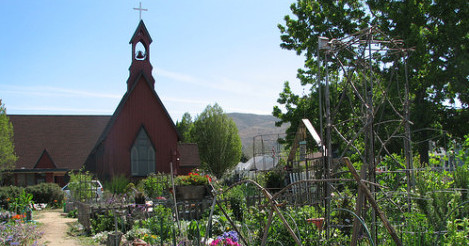
 )
)HL asks:
What I am seeing is that the understandably busy lives of even highly motivated Christian professionals often lead them to become more and more isolated from those parts of society most in need of outreach, friendship, and fellowship from Christians. So’how can those in the hectic years of research, working on getting those final papers done for the PhD, etc., not lose touch with the problems within their own local community?
Continuing on from last week’s post, let’s approach this question from another direction. While not directly an answer, I am reminded of the recent survey results indicating churchgoers are more likely to see religion and science as compatible. Many science professionals were encouraged by this observation. While I think there are multiple ways to interpret the finding, it is consistent with the idea that local congregations are a good place for different people to interact.
Many academics and other highly specialized professionals may paradoxically have relatively few peers with the same focus and yet still spend most of their time with those people. Such specialized work involves a lot of context, which creates an incentive to work primarily with people who share that context. By contrast, a place like a church tends to group people geographically rather than by field of specialization, making them a good place to meet people with different contexts and, presumably, different problems.
By way of example, last year I started volunteering with the high school youth group at my church. Once a week, I help lead a small group of junior and senior young men. In that time, they have shared a number of very personal and pressing concerns, allowing me the privilege of helping them talk through problems they want to solve and work out what kind of men they want to become. Now, granted we still have many things in common, but their high school experience is very different from mine. And by virtue of working with these kids, I sometimes also have the opportunity to address others’ concerns as the kids seek to help and support their friends.
As with last week, this is a partial solution that may work out better for some than others. Serving within the church will have its limits, but many local churches also provide opportunities to serve the community outside the church. So I think many folks will find their local church a good place to start connecting to their community.
How has your local church helped you connect to the problems of your local community?
Andy has worn many hats in his life. He knows this is a dreadfully clichéd notion, but since it is also literally true he uses it anyway. Among his current metaphorical hats: husband of one wife, father of two teenagers, reader of science fiction and science fact, enthusiast of contemporary symphonic music, and chief science officer. Previous metaphorical hats include: comp bio postdoc, molecular biology grad student, InterVarsity chapter president (that one came with a literal hat), music store clerk, house painter, and mosquito trapper. Among his more unique literal hats: British bobby, captain’s hats (of varying levels of authenticity) of several specific vessels, a deerstalker from 221B Baker St, and a railroad engineer’s cap. His monthly Science in Review is drawn from his weekly Science Corner posts — Wednesdays, 8am (Eastern) on the Emerging Scholars Network Blog. His book Faith across the Multiverse is available from Hendrickson.

Leave a Reply